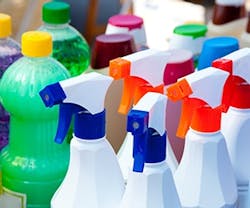Are Cleaning Products Making Your Staff Sick?
The numerous amounts of chemicals used throughout a building can be head spinning. The product labels may tell you one thing, while other authoritative sources claim the same cleaning solution is poisonous.
The Cleaning Product Right to Know Act of 2017, a recent bill signed recently into California law clears up this confusion, becoming the first state to require ingredient labeling on both product labels and online for cleaning products. Moreover, it may create a domino effect for the rest of United States.
Unlike food products or cosmetic applications, no federal requirements exist for disclosing ingredients in cleaning products, which means this law will raise a new standard for cleaning product ingredient disclosure not just in California but also across the nation.
The importance of cleaning products users knowing any potential risks and unhealthy exposures include but are not limited to pregnant women, cancer survivors, parents of children with allergies, or anyone else looking to their reduce exposure to harmful chemicals
California Governor Jerry Brown recently signed the bill into law, authored by Senator Ricardo Lara (D-Bell Gardens). Senator Lara points out that domestic workers and custodial staff exposed to cleaning products at work all day will be able to advocate for safer alternatives.
“People around the country and especially Californians are demanding more disclosure about the chemicals in products we use,” says Senator Ricardo Lara. “The science is clear, and we have seen the data about how cleaning product chemicals affect parents, children, and people with pre-existing conditions, and workers who use these products all day, every day. The Cleaning Product Right to Know Act is going to clear the air for shoppers and workers about products they use every day.”
A key and unprecedented point of the law requires that hazardous ingredients must be disclosed even if they are part of a recipe that is considered a trade secret.
In a separate statement, the Natural Resources Defense Council cited these statistics when explaining why the labels are needed:
- According to the California Department of Public Health, about 10% of all work-related asthma cases are associated with cleaning products.
- A study co-authored by New York State Department of Health scientists found that children born to women who held cleaning jobs while pregnant have an elevated risk of birth defects.
- The US EPA notes that about six percent of janitors experience a job-related injury from chemical exposures to cleaning products every year.
Leading manufacturers of cleaning products also embraced the legislation, including California-based Honest Company and WD-40, Seventh Generation, Procter & Gamble, SC Johnson, Reckitt Benckiser, Unilever, Eco Lab, fragrance maker Givaudan, and the Consumer Specialty Products Association, the trade association representing major manufacturers.
The Cleaning Product Right to Know Act will require online ingredient listing by January 1, 2020, and on-package disclosure by January 1, 2021, to give manufacturers time to reformulate their products and remove harmful chemicals.
You can see the Cleaning Product Right to Know Act of 2017 page to find out more about the law.
